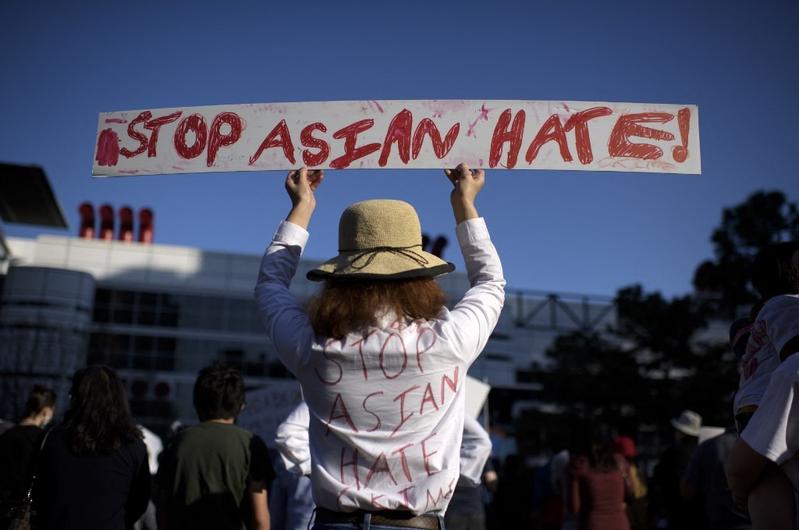 Sally Sha holds up a sign during a Stop Asian Hate rally at Discovery Green in downtown Houston, Texas on March 20, 2021. (PHOTO / AFP)
Sally Sha holds up a sign during a Stop Asian Hate rally at Discovery Green in downtown Houston, Texas on March 20, 2021. (PHOTO / AFP)
George Takei, known for his acting role in the 1960s TV series Star Trek, has told of his experience as a child in an internment camp for Japanese in the US and encouraged Asian Americans to combat racism through political action.
Takei was taking part in a virtual discussion organized by Serica Initiative, SupChina and the Midwest USA Chinese Chamber of Commerce on Friday.
The actor was joined by Lee Wong, an Ohio elected official known for recently revealing his scars from US Army service to confront those who question his Americanness and patriotism.
Takei, who will turn 84 on April 20, was 5 years old when he and his family were taken from their home and put in the camp along with 120,000 other Japanese Americans on the West Coast-without charges, trials and due process in 1942-under an executive order from then-president Franklin Roosevelt.
Another figure behind the internments was Earl Warren, then-attorney general in California, who had his sights on the governor's seat.
"He saw that the most popular issue in California at that time was the lockup of Ja--," Takei said. "He made the most amazing statement: We have no reports of spy or sabotage by Japanese Americans, and that is ominous because the Japanese are inscrutable. You can't tell what they are thinking from that placid face. So as a preventive, it will be prudent to lock them up before they do anything."
The actor said the absence of evidence became the evidence in those pushing for internment.
ALSO READ: US urged to act on systemic racism
"With that he (Warren) won and became a popular governor and elected three times and went on to be appointed as chief justice at the Supreme Court," Takei told the forum.
'Wanton lawlessness'
It was the most egregious violation of the Constitution by Roosevelt, who had led the US out of the Great Depression, Takei said. "With that kind of wanton lawlessness, we were in prison for four years. During those four years, incredible cruelties against innocent people were perpetrated one after another."
Takei pointed out that from the beginning there was intrinsic prejudice and discrimination against Asian immigrants.
Besides the 1882 Chinese Exclusion Act, which denied citizenship to Chinese immigrants, there were the alien land laws, which stipulated that people ineligible for citizenship could not buy land in states such as California, Oregon and Washington.
"It said nothing about Asians, but the only aliens ineligible to citizenship were immigrants from Asia. So, there was systemic and worked-in prejudices that had become law against us," Takei said.
While most Japanese-American parents didn't talk to their children about the internment camps because of the pain associated with them, Takei's father shared his experience and wisdom with him.
READ MORE: US House passes policing overhaul plan as impasse deepens
"My father said, 'This is a democracy (where) we are Americans like any other Italian Americans or Irish Americans or African Americans. We have to participate in the American process. We are the ones that give those noble words meaning and we have to actively participate'," Takei said, adding that he followed that advice by being active in the performing arts.
"I would encourage young folks today to take jobs as police officers, civil servants instead of traditionally doctors and engineers. There are many benefits in those areas," Wong said. "They all protect us in the Asian American communities. AAPI has to take the initiative and stop being marginalized. We have to toot our own horn."
Hundreds of people across the country participated in the forum.


